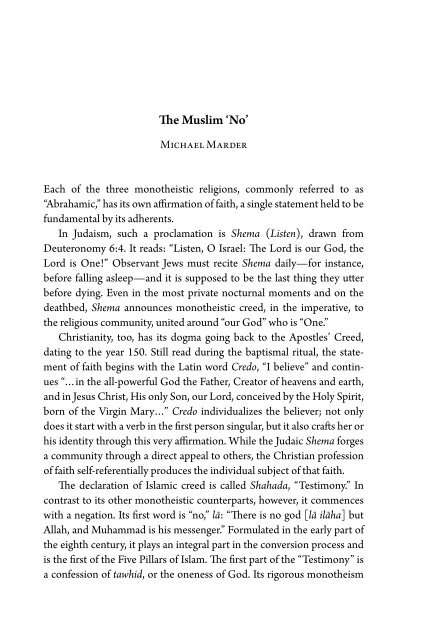The Philosophical Salon
Marder-Vieira_2017_The-Philosophical-Salon
Marder-Vieira_2017_The-Philosophical-Salon
You also want an ePaper? Increase the reach of your titles
YUMPU automatically turns print PDFs into web optimized ePapers that Google loves.
<strong>The</strong> Muslim ‘No’<br />
Michael Marder<br />
Each of the three monotheistic religions, commonly referred to as<br />
“Abrahamic,” has its own affirmation of faith, a single statement held to be<br />
fundamental by its adherents.<br />
In Judaism, such a proclamation is Shema (Listen), drawn from<br />
Deuteronomy 6:4. It reads: “Listen, O Israel: <strong>The</strong> Lord is our God, the<br />
Lord is One!” Observant Jews must recite Shema daily—for instance,<br />
before falling asleep—and it is supposed to be the last thing they utter<br />
before dying. Even in the most private nocturnal moments and on the<br />
deathbed, Shema announces monotheistic creed, in the imperative, to<br />
the religious community, united around “our God” who is “One.”<br />
Christianity, too, has its dogma going back to the Apostles’ Creed,<br />
dating to the year 150. Still read during the baptismal ritual, the statement<br />
of faith begins with the Latin word Credo, “I believe” and continues<br />
“…in the all-powerful God the Father, Creator of heavens and earth,<br />
and in Jesus Christ, His only Son, our Lord, conceived by the Holy Spirit,<br />
born of the Virgin Mary…” Credo individualizes the believer; not only<br />
does it start with a verb in the first person singular, but it also crafts her or<br />
his identity through this very affirmation. While the Judaic Shema forges<br />
a community through a direct appeal to others, the Christian profession<br />
of faith self-referentially produces the individual subject of that faith.<br />
<strong>The</strong> declaration of Islamic creed is called Shahada, “Testimony.” In<br />
contrast to its other monotheistic counterparts, however, it commences<br />
with a negation. Its first word is “no,” lā: “<strong>The</strong>re is no god [lā ilāha] but<br />
Allah, and Muhammad is his messenger.” Formulated in the early part of<br />
the eighth century, it plays an integral part in the conversion process and<br />
is the first of the Five Pillars of Islam. <strong>The</strong> first part of the “Testimony” is<br />
a confession of tawhid, or the oneness of God. Its rigorous monotheism


